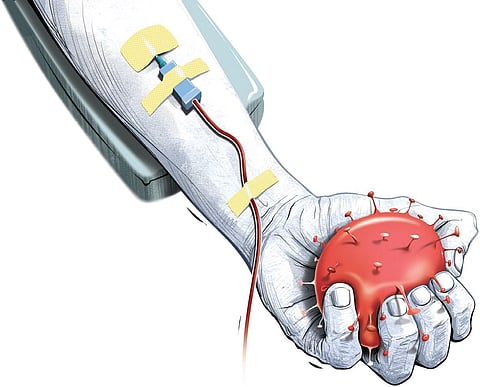

There’s something doctors around the country want you to know: it’s safe to donate blood right now. And for many, it is vital the rest of us do. As World Blood Donor Day came and went on Sunday, its relevance was largely lost amid other dire medical news, but that doesn’t take away its importance.
The thing is, you cannot get COVID-19 by donating blood. “This is the message we want to get out there.” says Dr Gaurav Kharya, Clinical Lead at Centre of Marrow Transplant and Cellular Therapy, and Senior Consultant at Paediatric Haematology, Oncology and Immunology, Indraprastha Apollo Hospitals. Dr Kharya runs the blood donation drive at Apollo, and adds that the problem is largely psychological, with people, even regular donors, being scared to visit hospitals at a time of pandemic, despite the stringent sterilisation procedures followed by blood banks around the country.
“We’ve had a lot of donors who still come and do their part, but ask us not to tell their parents or relatives that they’ve been donating blood, because they don’t want to carry the stigma of having visited a hospital back to their homes during this time,” notes Dr Kharya. This means a large proportion of donors are youthful and determined to make a difference in the lives of others, despite potential parental opposition.
Dr Nita Radhakrishnan of the Paediatric Haematology Department at Child PGI Hospital, Noida, commented that it was difficult to collect blood at the beginning of lockdown. “Even a COVID-19 survivor can donate blood after a gap of three months and it is safe. But now, even when there are fewer restrictions, people are still not coming to hospitals because they are scared to visit. Yet, we have managed to gather sufficient donors and it is increasing,” she added.
Hospitals everywhere are issuing ‘blood passes’, which allows donors and an attendant, relative or friend to travel between restricted areas to donate blood. These passes, issued by the hospitals and approved by the appropriate authorities, ensure freedom of movement. More than that, despite the general perception of hospitals being petri-dishes of infection, they are in fact the exact opposite thanks to stringent sterilisation protocols introduced way before the world had heard of COVID-19.
Since then, those protocols have only gotten stricter and yes, more stringent. “The entire staff of blood donation banks is kitted out in N95 masks and other PPE, which makes the chances of spreading the virus negligible. Nothing we have seen till now indicates that SARS-CoV-2 virus is transmittable through blood transfusion,” says Dr Kharya, adding, that several smaller blood donation units have shut down because of a lack of donors. “The severe dip in donations has led to crises for patients with conditions that require regular blood donations. We at Apollo are lucky that we have a very dedicated group of donors, so we haven’t faced the dire situation that many colleagues have had to.”
With the decrease in blood donations, thalassaemia patients are having a tough time. Vaishnavi Deepak Bhutani, a 23-year-old with thalassemia, says the initial days of the lockdown were daunting as people didn’t want to donate blood and had too many questions. But the situation, she says, has improved with blood donor banks are even providing two units blood to each donor. “I had to struggle for blood, and send out messages on WhatsApp groups seeking for donors. The most asked question is if it is safe to donate blood during Corona and I had to explain how one can donate following safety protocols. I feel there needs to be a strong message that blood donation has no harm even in the times of Corona,” says Bhutani.
“Just the other day, we had a 12-year-old girl with Thalassemia come in because her regular donation bank could only provide her with one unit of blood regularly as opposed to the two she needed. We were able to provide that thanks to our large donor pool. She was already very weak and the situation would have deteriorated,” recalls Dr Kharya.For those willing donors still scared of visiting hospitals, for entirely justifiable reasons, many agencies including Red Cross and the government’s National Blood Transfusion Council (NBTC), have mobile units regularly traversing cities, towns, and villages, and ensure your health, even as you help others.
Unwilling to step out?
For those willing donors still scared of visiting hospitals, for entirely justifiable reasons, many agencies including Red Cross and the government’s NBTC, have mobile units regularly traversing cities, towns, and villages, and ensure your health, even as you help others.
(With inputs from Somrita Ghosh)